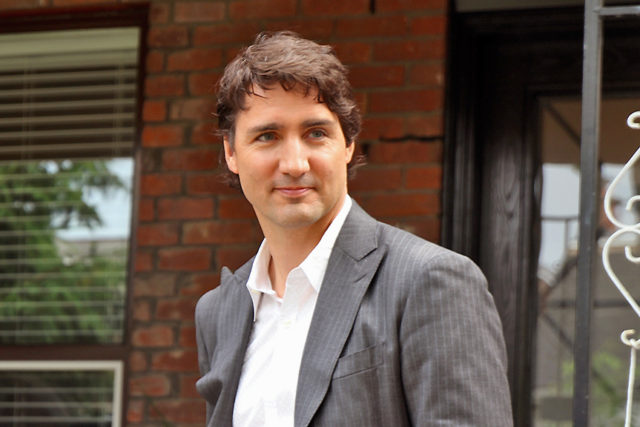
Ottawa cops may call for Canadian military to stop COVID vaccine mandate protesters Prime Minister of Canada Justin Trudeau (Alex Guibord/Flickr)
The chief of police in Ottawa, Canada, said on Wednesday that the Canadian Armed Forces might be needed to control the Freedom Convoy protesters who remain in the nation’s capital.
Ottawa police Chief Peter Sloly called the protest “a national issue” during a briefing with city councilors, Fox News reported. “I am increasingly concerned there is no policing solution to this,” he added.
Sloly said removing demonstrators from the city involves risks, and that he would need a force of 50,000 law enforcement officers to block access to the capital.
“There is no lawful authority to seal a city. There’s no practical capability to seal a city of this size,” Sloly said.
A reporter asked the chief to clarify his comments, noting that his remarks were “alarming to people.”
Sloly said authorities are considering “every potential option available to us within the legal bounds from negotiation through to court injunction through to an enforced removal.”
“Increasingly, as we see demonstrations, not just here, but elsewhere in the country, where there are efforts by strictly a policing action, we are not as confident as we have been that police alone will resolve this situation substantially, never mind in totality,” he continued.
“It is a local [demonstration], a provincial demonstration, a national demonstration, and one that has international elements associated to it,” Sloly added.
The reporter pressed Sloly again, saying, “When you say ‘other than police,’ do you mean politics? Do you need military? I don’t understand the answer. I understand it’s not only police, but then what are those other options that are not police options that we might need?” the reporter asked.
“I think you just listed most of them right there,” Sloly responded.
The demonstration against vaccine mandates has significantly dissipated since it first arrived in Ottawa over the weekend, but a significant number of protesters say they will not leave until all vaccine mandates and COVID-19 related restrictions are lifted.
Also on Thursday, Canadian Prime Minister Justin Trudeau said sending the military to Ottawa to control the anti-COVID mandate demonstration is “not in the cards right now.”
“Our focus is on being there to support the police of jurisdiction, support the City of Ottawa and the government of Ontario. We will, of course, look at any formal requests they sent us. But our reoccupation remains being there for the citizens of Ottawa, the neighborhoods that have been significantly disrupted by these protests, but these protesters. People going to school, people going to work, small business owners being harassed for wearing masks. Being faced with hateful rhetoric. As a federal government, the [Royal Canadian Mounted Police] has been there to provide support to the police of jurisdiction, the Ottawa Police. And of course, we will be there to respond to any formal requests from either the city or the province,” Trudeau said.
"One has to be very, very cautious before deploying military in situations engaging Canadians," PM Trudeau says when asked re: option of sending military to end Ottawa protest. "As of now, there have been no requests and that is not in the cards right now," the PM says.#cdnpoli pic.twitter.com/13LNx2l14w
— CPAC (@CPAC_TV) February 3, 2022
“One has to be very, very cautious before deploying military in situations engaging Canadians. It is not something that anyone should enter into lightly,” he continued. “As of now, there have been no requests and that is not in the cards right now.”
Earlier this week, Trudeau said he supports protests when he agrees with their goals and called “Black Lives Matter” an “excellent example” of a praise-worthy cause.
“I have attended protests and rallies in the past. When I agreed with the goals, when I supported the people expressing their concerns and their issues, Black Lives Matter is an excellent example of that,” Trudeau said Monday at a virtual news conference.
NOW – Canada's PM Justin Trudeau accuses the trucker convoy crowd of "hateful rhetoric" and "violence toward citizens," he rather prefers to attend BLM protests. pic.twitter.com/JpPhpTKZhm
— Disclose.tv (@disclosetv) January 31, 2022
Last year, after a number of Catholic churches in Canada were burned down, Trudeau said he condemns the violence but that he understands the anger.
“It is unacceptable and wrong that acts of vandalism and arson are being seen across the country, including against Catholic churches,” he told reporters, according to the CBC.
“The anger … is real,” he later added. “People have gone decades and even generations living with intergenerational trauma, with outcomes and institutional racism that has created extreme difficulties for Indigenous peoples across this country that are also the legacy of residential schools.”




